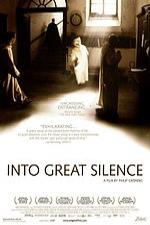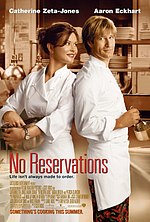
Knight at the Movies Archives
Aaron Eckhart tries his darndest to warm up the steely Catherine Zeta-Jones, meanwhile, Monks Run Amok! in a lyrical
documentary (Not really but isn't that a great tagline)
documentary (Not really but isn't that a great tagline)
Catherina Zeta-Jones is not a film star that inspires adoration. It’s not just her impenetrable gaze; steely beauty and icy demeanor
(no matter the role) that subconsciously warn audiences “keep your distance.” There’s also more than a hint of Joan Crawford’s
famous control in her screen persona that keeps viewers at bay. Even when she’s vulnerable onscreen, turning on the tears, one can
sense her hedging her bets. But perhaps Zeta-Jones knows this and utilizes it. Her best roles – her Oscar turn in Chicago as the
sultry, cynical man trap Velma Kelly, her quick turn from the pampered, scared wife of a drug lord to his partner in crime in Traffic
and the icy divorcee in Intolerable Cruelty – have played up the ice queen demeanor.
On paper Zeta-Jones’ character in the rather odd romantic comedy No Reservations – a control freak character masking insecurity
probably seemed like a great match for her implacable personality. But the movie, a remake of the German film Mostly Martha,
veers wildly in tone and like Zeta-Jones, is hard to love. She plays Kate, the head chef at a fancy Manhattan restaurant in the
trendy SoHo neighborhood who controls her kitchen and staff with an iron fist, barely tolerates the customers and the owner of the
restaurant (Patricia Clarkson) and has no life outside of her fabulous gourmet cooking. But tragedy intervenes when her sister is
killed in a car accident and Kate is left to raise her young niece Zoe (played by Little Miss Sunshine’s winning Abigail Breslin).
Naturally, Kate doesn’t know the first thing about being a mother and a series of low comedy scenes attesting to this follow.
While Kate has been away Clarkson as the owner has seized the opportunity to bring in another chef, Nick (Aaron Eckhart). This
teddy bear (almost literally from the look of his stubble) whose specialty of course is Italian cooking with all that implies, brings
warmth and personality to the kitchen and though fireworks aplenty happen when Kate learns of this, it’s not long before Fire and Ice
will come together and make beautiful partners. Eckhart does his best with a stock character who loves all things Italian (read:
sensual) and must constantly express it.
But Eckhart’s just one of many stock elements in the picture. In fact, EVERYTHING in the movie – from it’s by the numbers script,
sets, and performances to the montages, cut to the usual pop songs – seems prepackaged. The exception is the movie’s star and
stubborn ice queen Zeta-Jones who refuses to melt. Not even when her character Kate finally succumbs do you sense the actress
giving up control. It’s as if the actress is taking her cues from the Philip Glass score which tries hard at moments for warmth and
friskiness but only sounds comfortable when retreating quickly to Glass’ signature icy though very sophisticated tones (and whose
dumb dumb idea was it to hire him for a romantic comedy in the first place?).
Susceptible audience members may quickly take No Reservations to heart and feel comfort in its banal convention but I’m with Zeta-
Jones on this one. I’m resisting the kid. I’m holding back on the teddy bear man. I’m not giving an inch of myself but maybe will
pretend to. Mostly, I’m not going to cry unless I can do it in the privacy of the cooler where it’s nice and chilly and I can feel right at
home.
+++++++++++++++++++++++++++++++++++++++++++++++++++++++++++++++++++++++++++++++++++++++++++++
When filmmaker Philip Gröning wrote to the Carthusian monks of the Grand Chartreuse, a Catholic monastery in the French Alps
seeking permission to photograph their world it took the monks 16 years to acquiesce. The wait was worth it. Gröning spent six
months capturing on film their secluded world. To do so, he lived in the order and observed their strict rules, living in almost hermit-
like solitude and speaking only under prescribed conditions. The result, titled Into Great Silence is a three-hour hypnotic treatise
on the rewards of contemplation, and a way of life that lives up to the description offered by the order: a life of “joyful penitence.”
This simplistic way of life, as Gröning’s film observes, is filled with its own quiet, hard earned rewards and the bliss of constant
interaction and observation of nature. Naturally, for a film with very little dialogue, sound takes on new meaning: a cough during
morning prayers, the almost inaudible sound of chewing during a meal, the dripping of icicles after a thaw, and especially the
breathtaking beauty of the monks’ Gregorian chants which are heard throughout resonant. This is a deeply reflective movie that
gives one the chance to experience a way of life so far removed from that of the modern day world as to be almost revelatory. The
movie has been a standing room only hit in Manhattan and makes its Chicago debut this week at the Siskel Film Center.
*No Reservations screened past my print deadline but in time for me to include it here.
(no matter the role) that subconsciously warn audiences “keep your distance.” There’s also more than a hint of Joan Crawford’s
famous control in her screen persona that keeps viewers at bay. Even when she’s vulnerable onscreen, turning on the tears, one can
sense her hedging her bets. But perhaps Zeta-Jones knows this and utilizes it. Her best roles – her Oscar turn in Chicago as the
sultry, cynical man trap Velma Kelly, her quick turn from the pampered, scared wife of a drug lord to his partner in crime in Traffic
and the icy divorcee in Intolerable Cruelty – have played up the ice queen demeanor.
On paper Zeta-Jones’ character in the rather odd romantic comedy No Reservations – a control freak character masking insecurity
probably seemed like a great match for her implacable personality. But the movie, a remake of the German film Mostly Martha,
veers wildly in tone and like Zeta-Jones, is hard to love. She plays Kate, the head chef at a fancy Manhattan restaurant in the
trendy SoHo neighborhood who controls her kitchen and staff with an iron fist, barely tolerates the customers and the owner of the
restaurant (Patricia Clarkson) and has no life outside of her fabulous gourmet cooking. But tragedy intervenes when her sister is
killed in a car accident and Kate is left to raise her young niece Zoe (played by Little Miss Sunshine’s winning Abigail Breslin).
Naturally, Kate doesn’t know the first thing about being a mother and a series of low comedy scenes attesting to this follow.
While Kate has been away Clarkson as the owner has seized the opportunity to bring in another chef, Nick (Aaron Eckhart). This
teddy bear (almost literally from the look of his stubble) whose specialty of course is Italian cooking with all that implies, brings
warmth and personality to the kitchen and though fireworks aplenty happen when Kate learns of this, it’s not long before Fire and Ice
will come together and make beautiful partners. Eckhart does his best with a stock character who loves all things Italian (read:
sensual) and must constantly express it.
But Eckhart’s just one of many stock elements in the picture. In fact, EVERYTHING in the movie – from it’s by the numbers script,
sets, and performances to the montages, cut to the usual pop songs – seems prepackaged. The exception is the movie’s star and
stubborn ice queen Zeta-Jones who refuses to melt. Not even when her character Kate finally succumbs do you sense the actress
giving up control. It’s as if the actress is taking her cues from the Philip Glass score which tries hard at moments for warmth and
friskiness but only sounds comfortable when retreating quickly to Glass’ signature icy though very sophisticated tones (and whose
dumb dumb idea was it to hire him for a romantic comedy in the first place?).
Susceptible audience members may quickly take No Reservations to heart and feel comfort in its banal convention but I’m with Zeta-
Jones on this one. I’m resisting the kid. I’m holding back on the teddy bear man. I’m not giving an inch of myself but maybe will
pretend to. Mostly, I’m not going to cry unless I can do it in the privacy of the cooler where it’s nice and chilly and I can feel right at
home.
+++++++++++++++++++++++++++++++++++++++++++++++++++++++++++++++++++++++++++++++++++++++++++++
When filmmaker Philip Gröning wrote to the Carthusian monks of the Grand Chartreuse, a Catholic monastery in the French Alps
seeking permission to photograph their world it took the monks 16 years to acquiesce. The wait was worth it. Gröning spent six
months capturing on film their secluded world. To do so, he lived in the order and observed their strict rules, living in almost hermit-
like solitude and speaking only under prescribed conditions. The result, titled Into Great Silence is a three-hour hypnotic treatise
on the rewards of contemplation, and a way of life that lives up to the description offered by the order: a life of “joyful penitence.”
This simplistic way of life, as Gröning’s film observes, is filled with its own quiet, hard earned rewards and the bliss of constant
interaction and observation of nature. Naturally, for a film with very little dialogue, sound takes on new meaning: a cough during
morning prayers, the almost inaudible sound of chewing during a meal, the dripping of icicles after a thaw, and especially the
breathtaking beauty of the monks’ Gregorian chants which are heard throughout resonant. This is a deeply reflective movie that
gives one the chance to experience a way of life so far removed from that of the modern day world as to be almost revelatory. The
movie has been a standing room only hit in Manhattan and makes its Chicago debut this week at the Siskel Film Center.
*No Reservations screened past my print deadline but in time for me to include it here.
Alone on a Hilltop Overlooking the Rest of the World:
No Reservations-Into Great Silence
7-25-07 Windy City Times Knight at the Movies Column*
By Richard Knight, Jr.
No Reservations-Into Great Silence
7-25-07 Windy City Times Knight at the Movies Column*
By Richard Knight, Jr.


